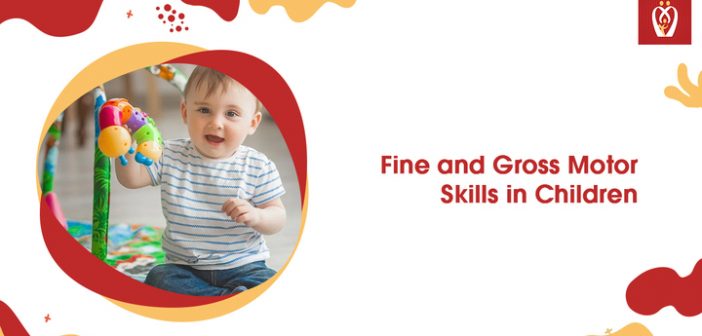The actions and tasks we perform daily are made possible by our motor skills. Abilities that involve precise control of the tiny muscles of the hand are known as “fine motor skills” (such as using a fork). To make larger motions, like walking and jumping, we need to have good balance, coordination, reflexes, and strength in our huge muscles.
Children’s motor abilities allow them to perform common chores, such as feeding themselves and moving from one place to another. Some motor abilities are often developed in children at specific ages; however, this is not always the case. A youngster with motor deficits struggles to move in a coordinated, efficient, and regulated manner. Your kid may require physical or occupational therapy if their fine or gross motor skill development appears to be delayed.
Fine motor skills
The development of fine and gross motor skills in infants and toddlers occurs at their speed. It’s normal for some youngsters to master some talents earlier than others. Preschool and the first few years of primary school are ideal times for children to develop these skills, which can begin as early as one or two months of age.
The following are some of the most critical fine motor abilities that children need to develop.
- The palmar arches allow the palms to be curled inwards. Writing, unbuttoning garments and gripping all need precise finger movement, which can be improved by strengthening these muscles.
- First-graders have a strong grasp on their wrists. In addition, finger strength and control improve in children who use this device.
- Precision gripping is done with the thumb, index finger, and other fingers on the skilled side of the hand.
- The ability to make little motions with the hand, where the thumb, index finger, and middle finger all touch, is known as intrinsic hand muscle development.
- Bilateral hand abilities allow for the simultaneous coordination of two hands.
- Children as young as four can start practicing scissor skills to build hand strength and eye-hand coordination.
As your child’s body control and coordination improve, so do their fine motor skills. Keep in mind that certain youngsters may acquire their fine motor skills and coordination earlier than others.
Shaking a rattle may come to one infant at three months, but it may not come to another until a month later. So the fact that this is happening is very natural.
Do not worry if your child’s development is slower than that of other children. Keep in mind that your child’s body is still developing. They may be able to develop new fine motor abilities in a few weeks or months when their hand muscles strengthen.
Gross motor skills
Compared to fine motor abilities, gross motor skills involve motions involving a larger number of muscle groups and a higher level of force and speed. Stair climbing and kicking are also included in this list. For example, when children learn to toss or catch a ball, they also learn to use their eyes and hands in tandem.
Delays in motor skills | Fine motor skills
Neurological and developmental disorders can cause difficulties in fine motor abilities. In many cases, children’s difficulties with fine motor skills aren’t discovered until they’re in preschool when it becomes more clear that they’re having trouble with schoolwork like copying shapes or letters.
Dysgraphia (learning difference in writing) and developmental coordination disorder are among the conditions that may be diagnosed in children. However, these conditions are not commonly understood. If a child has difficulty with fine motor skills, occupational therapy, modifications, or assistive technology may be necessary.
As a parent, you’re probably most concerned when your child fails to meet gross motor milestones like rolling over, crawling, pulling themselves up on furniture, and taking their first steps. However, fine motor milestones are just as important to keep an eye on. When a youngster is growing up, it’s easy to see how active they are when playing or participating in sports.
Missing significant developmental milestones is frequently the first sign that a child has neurological issues, delays in development, or impairments. Dyspraxia may also cause delays in gross motor skills. Gross motor deficits may necessitate physical therapy or adaptations or assistive technologies to keep up with mobility or athletics for children.
Don’t hesitate to talk to your pediatrician about any concerns you have regarding your child’s motor abilities. If you want to help your kid develop their motor skills, if occupational or physical therapy is recommended, you will be advised on how to work with your child at home.







